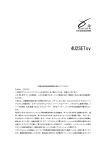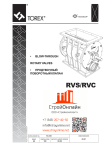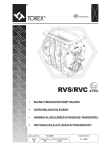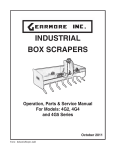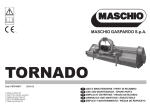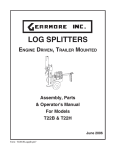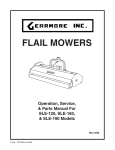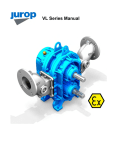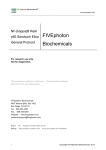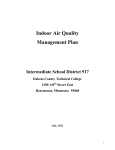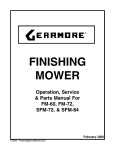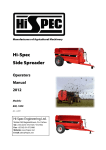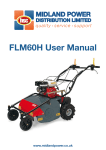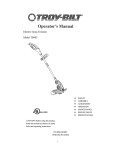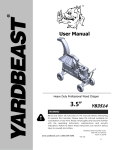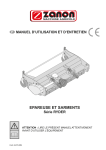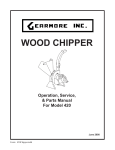Download HYDRAULIC SHREDDER
Transcript
HYDRAULIC SHREDDER Operation, Service & Parts Manual For Models: GMS69-HS & GMS79-HS September 2006 FORM: GMSMower.QXD TABLE OF CONTENTS 1 Preliminary Information . . . . . . . . . . . . . . . . . . . . . . . . . . . . . . . . . . . . . . . . . . . . . . . . .1 1.1 1.2 1.3 1.4 Symbols . . . . . . . . . . . . . . . . . . . . . . . . . . . . . . . . . . . . . . . . . . . . . . . . . . . . . . . .1 User Cooperation . . . . . . . . . . . . . . . . . . . . . . . . . . . . . . . . . . . . . . . . . . . . . . . .2 Standard Compliance . . . . . . . . . . . . . . . . . . . . . . . . . . . . . . . . . . . . . . . . . . . . .2 Manufacturer's Liability . . . . . . . . . . . . . . . . . . . . . . . . . . . . . . . . . . . . . . . . . . . .2 2 Technical Information . . . . . . . . . . . . . . . . . . . . . . . . . . . . . . . . . . . . . . . . . . . . . . . . . .3 2.1 2.2 Use . . . . . . . . . . . . . . . . . . . . . . . . . . . . . . . . . . . . . . . . . . . . . . . . . . . . . . . . . . . .3 Noise - Vibrations . . . . . . . . . . . . . . . . . . . . . . . . . . . . . . . . . . . . . . . . . . . . . . . .3 3 Safety Information . . . . . . . . . . . . . . . . . . . . . . . . . . . . . . . . . . . . . . . . . . . . . . . . . . . . .4 3.1 Operational Safety . . . . . . . . . . . . . . . . . . . . . . . . . . . . . . . . . . . . . . . . . . . . . . . .4 4 Handling . . . . . . . . . . . . . . . . . . . . . . . . . . . . . . . . . . . . . . . . . . . . . . . . . . . . . . . . . . . . .5 4.1 4.2 4.3 4.4 4.5 4.6 4.7 4.8 Transport . . . . . . . . . . . . . . . . . . . . . . . . . . . . . . . . . . . . . . . . . . . . . . . . . . . . . . .5 Handling, Lifting, & Unloading . . . . . . . . . . . . . . . . . . . . . . . . . . . . . . . . . . . . .5 Application on Machine Hydraulic . . . . . . . . . . . . . . . . . . . . . . . . . . . . . . . . . . .6 Connecting Hydraulic Hoses . . . . . . . . . . . . . . . . . . . . . . . . . . . . . . . . . . . . . . .6 Rear Hatch Adjustment . . . . . . . . . . . . . . . . . . . . . . . . . . . . . . . . . . . . . . . . . . . .7 Adjusting Height of Cut . . . . . . . . . . . . . . . . . . . . . . . . . . . . . . . . . . . . . . . . . . .8 Adjusting Variable Displacement Motor . . . . . . . . . . . . . . . . . . . . . . . . . . . . . .8 Fitting Machine to Operating Machine Hydraulics . . . . . . . . . . . . . . . . . . . . . .9 5 Operation . . . . . . . . . . . . . . . . . . . . . . . . . . . . . . . . . . . . . . . . . . . . . . . . . . . . . . . . . . . .11 5.1 5.2 5.3 5.4 5.5 5.6 5.7 5.8 5.9 5.10 Start-Up . . . . . . . . . . . . . . . . . . . . . . . . . . . . . . . . . . . . . . . . . . . . . . . . . . . . . . .11 Forward Speed . . . . . . . . . . . . . . . . . . . . . . . . . . . . . . . . . . . . . . . . . . . . . . . . . .11 Alignment . . . . . . . . . . . . . . . . . . . . . . . . . . . . . . . . . . . . . . . . . . . . . . . . . . . . . .11 Turning Machine . . . . . . . . . . . . . . . . . . . . . . . . . . . . . . . . . . . . . . . . . . . . . . . .12 Cutting & Mulching Vegetation . . . . . . . . . . . . . . . . . . . . . . . . . . . . . . . . . . . .12 Various Types of Motors . . . . . . . . . . . . . . . . . . . . . . . . . . . . . . . . . . . . . . . . .13 Disconnecting . . . . . . . . . . . . . . . . . . . . . . . . . . . . . . . . . . . . . . . . . . . . . . . . . .13 Operator . . . . . . . . . . . . . . . . . . . . . . . . . . . . . . . . . . . . . . . . . . . . . . . . . . . . . . .14 Unforeseen & Inadmissable Uses . . . . . . . . . . . . . . . . . . . . . . . . . . . . . . . . . . .15 Improper Use . . . . . . . . . . . . . . . . . . . . . . . . . . . . . . . . . . . . . . . . . . . . . . . . . .15 6 Maintenance . . . . . . . . . . . . . . . . . . . . . . . . . . . . . . . . . . . . . . . . . . . . . . . . . . . . . . . . . .16 6.1 6.2 Tensioning Belts . . . . . . . . . . . . . . . . . . . . . . . . . . . . . . . . . . . . . . . . . . . . . . . .16 Replacing Belts . . . . . . . . . . . . . . . . . . . . . . . . . . . . . . . . . . . . . . . . . . . . . . . . .17 TABLE OF CONTENTS 6.3 6.4 6.5 6.6 6.7 6.8 6.9 Lubrication . . . . . . . . . . . . . . . . . . . . . . . . . . . . . . . . . . . . . . . . . . . . . . . . . . . . .17 Oil Leaks . . . . . . . . . . . . . . . . . . . . . . . . . . . . . . . . . . . . . . . . . . . . . . . . . . . . . .18 Replacing Flails . . . . . . . . . . . . . . . . . . . . . . . . . . . . . . . . . . . . . . . . . . . . . . . . .18 Replacing Swinging Hammers . . . . . . . . . . . . . . . . . . . . . . . . . . . . . . . . . . . . .18 Replacing Fixed Hammers . . . . . . . . . . . . . . . . . . . . . . . . . . . . . . . . . . . . . . . .18 Storage . . . . . . . . . . . . . . . . . . . . . . . . . . . . . . . . . . . . . . . . . . . . . . . . . . . . . . . .19 Dismantling, Demolition, & Disposal . . . . . . . . . . . . . . . . . . . . . . . . . . . . . . .19 7 Troubleshooting . . . . . . . . . . . . . . . . . . . . . . . . . . . . . . . . . . . . . . . . . . . . . . . . . . . . . .20 8 Spare Parts . . . . . . . . . . . . . . . . . . . . . . . . . . . . . . . . . . . . . . . . . . . . . . . . . . . . . . . . . . .21 8.1 8.2 8.3 Communication . . . . . . . . . . . . . . . . . . . . . . . . . . . . . . . . . . . . . . . . . . . . . . . . .21 Spare Parts . . . . . . . . . . . . . . . . . . . . . . . . . . . . . . . . . . . . . . . . . . . . . . . . . . . . .21 Logbook . . . . . . . . . . . . . . . . . . . . . . . . . . . . . . . . . . . . . . . . . . . . . . . . . . . . . . .21 9 Installation . . . . . . . . . . . . . . . . . . . . . . . . . . . . . . . . . . . . . . . . . . . . . . . . . . . . . . . . . . .22 10 Drawings & Parts Lists . . . . . . . . . . . . . . . . . . . . . . . . . . . . . . . . . . . . . . . . . . . . . . .23 10.1 Deck Assembly . . . . . . . . . . . . . . . . . . . . . . . . . . . . . . . . . . . . . . . . . . . . . . . . .23 10.2 Rotorshaft Assembly . . . . . . . . . . . . . . . . . . . . . . . . . . . . . . . . . . . . . . . . . . . . .26 10.3 Hydraulic Transmission . . . . . . . . . . . . . . . . . . . . . . . . . . . . . . . . . . . . . . . . . . .28 10.4 Roller Assembly . . . . . . . . . . . . . . . . . . . . . . . . . . . . . . . . . . . . . . . . . . . . . . . . .30 10.5 Motor . . . . . . . . . . . . . . . . . . . . . . . . . . . . . . . . . . . . . . . . . . . . . . . . . . . . . . . . .31 10.6 Shaft & Bearing Kit . . . . . . . . . . . . . . . . . . . . . . . . . . . . . . . . . . . . . . . . . . . . . .32 10.7 Housing Kit . . . . . . . . . . . . . . . . . . . . . . . . . . . . . . . . . . . . . . . . . . . . . . . . . . . .33 10.8 Cam Plate Kit . . . . . . . . . . . . . . . . . . . . . . . . . . . . . . . . . . . . . . . . . . . . . . . . . .34 10.9 Manual Control Kit . . . . . . . . . . . . . . . . . . . . . . . . . . . . . . . . . . . . . . . . . . . . . .35 10.10 Distributor Kit . . . . . . . . . . . . . . . . . . . . . . . . . . . . . . . . . . . . . . . . . . . . . . . . . .36 11 Limited Warranty . . . . . . . . . . . . . . . . . . . . . . . . . . . . . . . . . . . . . . . . . . . . . . . . . . . .37 Date of Purchase:__________________________ Model Number:____________________________ Serial Number:____________________________ PRELIMINARY INFORMATION 1 PRELIMINARY INFORMATION This manual refers to the following machines: GRF-HS and GMS-HS. All models are used and adjusted in practically the same manner. Separate note is given for those models, which are adjusting differently. The models are listed in increasing order according to the power required for operation. They start from a minimum of 50HP up to a maximum of 120 HP. 1.1 SYMBOLS: MEANING AND USE In this manual, some symbols are used to draw the reader's attention and to emphasize some particularly important aspects. MEANING AND EXPLANATION OF THE SYMBOLS: DANGER: z z z Indicates a danger with the risk of injury, even serious injury. Always carefully follow the instructions marked with this Symbol, as failure to do so could lead to serious dangers and constitute a danger for the operator and any exposed persons. Follow the instructions to the letter! CAUTION: z z This indicates a note warning of possible damage to the machine or to other equipment. This is an important warning indicating that special care must be taken. WARNING - NOTE: z This indicates a warning or a note regarding key functions or providing useful information. Page 1 PRELIMINARY INFORMATION 1.2 COOPERATION - WITH THE USER The manual reflects the state of the art at the moment the machine was placed on the market and is an integral part of the machine itself. If the manufacturer deems it timely to send the user an addition to the manual, this document must be kept on hand with the manual itself. The manufacturer is always available for any additional information its clientele may require and to consider proposals to improve this manual, making it more responsive to their needs. 1.3 COMPLIANCE - WITH STANDARDS The machine has been designed and manufactured in compliance with the industrial machinery safety standards in force at the date the machine was placed on the market. In particular, the following legislative and uniform standards have been taken into consideration 1.4 MANUFACTURER - LIABILITY AND WARRANTY With reference to what is reported in the present manual. Gearmore, Inc. declines any responsibility if: z z z z The machine is used in a manner which does not comply with the national safety and accident prevention laws in force. The instructions given in this manual are not followed or are followed incorrectly. Unauthorized modifications are made to the machine. The spare parts used are not original parts supplied by Gearmore. To take advantage of the warranty, you must carefully follow all instructions and instructions indicated in the user's manual. In particular you must: z z z z Always operate within the limits of the machine. Always keep the machine well maintained Assign only properly trained operators to operate the machine. Use only original spare parts indicated by the manufacturer. Page 2 TECHNICAL INFORMATION 2 TECHNICAL INFORMATION 2.1 USE The machines are suitable for mulching vegetation of various sizes depending on the power available to drive the machine itself. this power rating ranges from a minimum of 50 HP for the GRF-HS units, to a maximum of 120 HP for the GMS-HS. The machines are connected to the tractor and driven by its hydraulic circuit. These units can cut down entire trees as the rotors can come into close contact with the trunk. This cuts a niche into the trunk which can be widened until the tree is felled. To perform these operations the operator ;must be trained and competent. The tractor must be guarded to protect the frame and cabin. all of the tractor's structural elements must be reinforced, suitable for forestry use requiring extremely sturdy protections for operator safety. In selecting the work to be performed, the operator must carefully follow all the regulations described as well as the Fob/Rops standard for drivers cabin safety (bulletproof glass, protection guards, pollen filters, rollbar, protection against tipping over). Moreover, lights must be installed to indicate the unit's presence on site as well as everything needed to ensure that the unit is used in utmost safety. Only the specific use and configuration indicated for the machine are admissible. Never use the machine in a manner contrary to the supplied instructions. The instructions given in this manual do not replace, but rather summarize, the obligations to comply with the current safety and accident prevention laws in force. 2.2 NOISE - VIBRATIONS The vibrations produced by a well maintained machine do not constitute an operator health hazard. Breakdowns can cause excessive vibrations; these must be immediately noted and eliminated to prevent compromising machine reliability and/or damaging operator health. Page 3 SAFETY INFORMATION 3 SAFETY AND ACCIDENT PREVENTION All instructions and warnings regarding machine operation and maintenance must be strictly adhered to. 3.1 OPERATIONAL SAFETY z z z z z z z z z z z Guards and safety shields are for your protection. DO NOT operate equipment unless they are in place. Read and observe all safety decals on the tractor and shredder. NEVER allow anyone within 25' of machine while it is in operation. DO NOT stop or start suddenly when going uphill or downhill. Avoid operation on steep slopes. Be alert for holes in terrain and other hidden hazards. Always drive slowly over rough ground. Reduce speed on slopes and in sharp turns to prevent tipping or loss of control. Be careful when changing direction on slopes. Stop shredder and tractor immediately upon striking an obstruction. Turn off engine, inspect shredder and repair any damage before resuming operation. Disengage power to shredder and stop engine before dismounting from tractor, before making any repairs or adjustments, transporting, or unclogging shredder. This implement is designed for a one-man operation. It is the responsibility of the tractor operator to see that no one is in the proximity of the implement when it is started. DO NOT operate the implement with another person within 25' of the implement. NEVER operate shredder with hatch in the wrong working position. NEVER run shredder with rotorshaft out of balance. Page 4 HANDLING 4 HANDLING - START UP All operations described in this section are extremely delicate and of utmost importance. If not performed correctly, they can create serious safety risk for the personnel exposed during the installation and even later when operating the machine. These operations must be performed by personnel using equipment and personal protection equipment in compliance with the current accident prevention and work safety laws. Never perform any operations unless you have thoroughly read this manual. 4.1 TRANSPORT This machine must be transported using an appropriate vehicle for the particular model. The machine must be secured with belts or with other appropriate means to prevent it from shifting positions while the vehicle is in motion. 4.2 HANDLING, LIFTING, AND UNLOADING Lift the machine only using the special hooks, indicated by a label on the hook attachment. To load the machine onto the transport vehicle or to unload it, always lift the machine using an adequate hoist (rated for the weight of the machine). Always use only the special hooks. Never lift or move the machine by anchoring it to the rotor; this could damage the rotor, which is the most delicate part of the machine and must be protected against unexpected strain. To prevent mistaken maneuvers which could cause hazardous situations and/or damage the machine, the personnel performing the operations must be adequately trained and authorized to perform these activities. Moreover the operator must have read and understood the instructions for handling the unit. Before moving the machine visually check it for any unstable parts which could cause a hazard. The manufacturer declines any responsibility for damages to person or things stemming from improper handling of the machine by unsuitable personnel and/or using an inadequate hoist. Page 5 HANDLING 4.3 APPLICATION ON MACHINE HYDRAULIC Before performing any operations, make certain that the power, oil capacity, and weight of the operating machine comply with those indicated in the table of technical characteristics. To insure stability, the weight of the unit must be proportional to the weight of the operating machine. An approximate calculation is to multiply the weight of the unit by 17. The oil supply - pressure and flow - needed to drive the head is quoted in the literature. If the manufacturer is informed of the type of hydraulic system installed on the prime mover, he will be happy to suggest how the various models can be installed. A circuit diagram of the hydraulic circuit of the prime mover will be required. This should also include any options that can be fitted. The feed and return hoses of all models are flanged to the connections of the motor piping. Besides the fluid delivery and return hoses, another hose (third line return) draining freely into the oil tank must always be installed. On all machines, direction of rotation is the same; looking at the rotor from the trans mission (belt) side, the rotor must always turn clockwise. This is necessary not only to insure efficient use, but also to insure safety. In this rotational direction the material being mulched is taken through between the rotor and the casing until it has passed all the way through and is deposited behind the machine. The backpressure in the drain line must never exceed 25 P.S.I. 4.4 CONNECTING THE HYDRAULIC HOSES When attaching the quick-release couplings, make certain that they are hooked up to the appropriate connections. The first time they are installed on the machine you must purge the air. The skid shoes are an important component. When positioned correctly, the skid shoes enable you to make the most of the potential and features of the machine. The height of the skids can be adjusted to bring the flails closer to or move them further away from the ground. To adjust the skid shoes you must: z Stop the tractor and the mower and make certain that the rotor has come to a complete stop. Page 6 HANDLING z Stop the tractor and the mower and make certain that the rotor has come to a complete stop. z Lift the machine 30 cm (12") off the ground. z Place adequate supports under the machine making certain that the ground can bear the weight. Make sure that the machine is perfectly stable. z Loosen and remove the bolts and nuts from the skid mounting bracket that secure the skids to the frame. z Set the skids in the desired position and secure it following the above operations in reverse order. Never perform these operations before the tractor and mower have come to a complete standstill. When operating the machine, make certain that no one is standing within the machine's operating radius. 4.5 ADJUSTING THE REAR HATCH The hatch protects the rotor and prevents material from being through out. However, in the most difficult forestry operations, it must be raised to the highest point so the unit can be brought in close, cutting the trunks of trees that are to be cut down and mulched. Proceed as follows: z To mulch material on the ground with a machine being drawn, the hatch must remain closed so that the material can be mulched as finely as possible. z To cut down standing vegetation, the hatch must be open although how much depends on the consistency and diameter of the plants. z To cut down standing vegetation, a guard frame with side arms must be used to gather it and prevent it from falling to the sides or back onto the tractor. They channel the vegetation into the line of the machine for mulching. Never let anyone approach the machine while the hatch is fully open! Page 7 HANDLING The hatch can be adjusted to several different positions. As previously mentioned, hatch adjustment is extremely important as this lets you regulate the power absorbed by the type of work. It also acts as a safety device. This makes it possible to achieve the best mulching effect given the tractor power, forward speed and the nature and size of the material being mulched. HATCH CLOSED: This position is generally used to mulch smaller material and, in general, whenever a fine, homogeneous mulch is required. HATCH FULLY OPEN: This position is used to mulch branches and large vegetation as well as to cut down standing vegetation such as shrubs or large masses of material or uprooted stumps. The material enters the machine from the adjustable door side of the machine, as this makes it easier for the material to enter. This position minimizes the power required and increases forward speed. When the machine is in use, objects may be thrown out; make certain all persons are outside the machine's operating radius and maintain a safe distance. 4.6 ADJUSTING THE HEIGHT OF THE CUT On all models, the skids can be adjusted by relocating the support bolts to vary their height; raising them lowers the rotor closer to the ground, lowering them moves the rotor away from the ground. Always make certain that all machine parts secured with nuts and bolts are fully tightened. 4.7 ADJUSTING THE VARIABLE DISPLACEMENT MOTOR All operations to install the machine on the track loader must be performed with the engine off and the key removed from the ignition. The variable displacement motor is adjusted by measuring the RPM and selecting the suitable speed for the unit, as indicated in the table. Never deviate from the suggested rates. Page 8 HANDLING 4.8 FITTING MACHINE TO OPERATING MACHINE EXCAVATOR HYDRAULIC SYSTEM For the unit to function properly, it is essential to follow some basic fitting instructions. Make certain that the feed and return hoses are the correct diameter and that they are rated for the pressures involved. In addition, they must be of adequate diameter for the required oil flow. On all operating machines, the return hose must run to the oil tank without any connection to other parts of the system. The maximum acceptable hose pressure is 25 P.S.I. Higher pressures cause motor damage. Make certain that the return hose is of adequate size, so that the oil can flow without increasing the pressure. The motors are calibrated for a maximum pressure of 3600 P.S.I.; higher pressure could overheat the system. Always check system pressure with an adequate pressure gauge. In addition, when the system permits, general valves with higher calibration are available upon request. The oil pressure in the discharge pipe must be below 25 P.S.I. Make absolutely certain that the connections are not restricted in any way. Never make looping connections. Improper restriction and bends in the pipe increase oil friction inside the pipe and also generate heat. All variable and fixed capacity motors supplied by the manufacturer have an anti-cavitation valve, which prevents cavitation in the feed line from damaging the operating machine hydraulic system. On all fixed capacity gear or piston motors not supplied by the manufacturer, an anti-cavitation valve must be installed between the hydraulic circuit delivery and return hoses. this allows the pump to take up oil from the return hose and into an open circuit preventing it from running dry, which could cause damage. To drive the unit, the manufacturer can provide (upon request) an accessory which is sized according to the oil capacity and which takes up oil from the system through a flow divider and supplies the unit. It must be installed by a technician who knows the operating machine thoroughly, (see attachment if given). For the system to function well, check the degree of oil filtration; it must never be less than 20>=75 microns absolute. Check the filters every 500 hours of operation. Maximum acceptable temperature inside the hydraulic circuit is 70/80C. Page 9 HANDLING For further clarification, regarding application of the closed circuit system, contact your local dealer/retailer. General rule of thumb: closed circuits generally require a 5/6 I-min capacity flow or washout on the low pressure circuit to cool the system. Never exceed a pressure of 25 P.S.I. bar in the return line. The flow valve must always be matched to the pump capacity. The manufacturer declines any responsibility for systems, which are not built in compliance with the above. During work, especially in the summer when it is extremely dry, remember that sparks generated as the unit comes into contact with stones, rocks, etc. could ignite fires. During the dry months, remember to be aware of this and use a suitable means to promptly put out any fire, which may start. Where possible, avoid using the machine under such conditions. Page 10 OPERATION 5 OPERATING THE MACHINE All operations described in this section should only be executed by personnel who have thoroughly read and understand all information in this manual and have been trained in the operation of the tractor and mower. 5.1 START-UP 1. Check that the unit has been installed and adjusted correctly, as indicated in the previous paragraphs. 2. Set the machine on the ground. 3. Start up the hydraulic system gradually; i.e. starting at the minimum and increasing to between 4/5 and maximum revolution before you start work. To prevent damaging the machine, always remain within the minimum and maximum r.p.m. The best results are achieved within this range. 5.2 FORWARD SPEED The machine can operate under very difficult conditions, hence, it is important to find a good compromise between forward speed and work quality for each type of work to be performed. For each machine the following parameters must be considered: z z z max. absorbed power min. and max. r.p.m. working speed. Before starting any work, check the ground for any foreign objects, which may cause damage, danger or pollute the area if hit by the machine. For example; pieces of steel or glass, nylon, steel wires or cables, polluting powders or liquids such as; pesticides or poisons, explosives, flammable substances, etc. Make certain that there is no one in the working area. If necessary, send them away before moving the machine. 5.3 ALIGNING THE MACHINE WITH THE GROUND With the machine lowered, check that its full width is resting on the ground and exerting the same pressure on the skids or roller, if applicable. Never load the skid with anything but the weight of the machine. Page 11 OPERATION 5.4 TURNING WITH THE MACHINE CONNECTED To prevent undue strain, particularly on the skids or roller, never make turns with the machine resting on the ground. To make a turn, lift the machine slightly, make the turn, straighten up, then lower the machine and continue working in the set position. Never turn corners with the roller on the ground; before turning, lift the unit off the ground slightly. 5.5 CUTTING DOWN AND MULCHING VEGETATION To cut down vegetation, it is best to work at a slow speed. slowly approach the vegetation. With the hatch open, begin to work the rotor into the trunk at approximately 40 cm (16") from the ground, running the machine at maximum power. Be ready to reduce the forward speed to maintain the correct rotor speed for maximum cutting power. Once the vegetation has been knocked down, keep the machine approximately 40 cm (16") from the ground and make a return run, with the hatch closed, to breakup the branches. To mulch the trunk, place the machine on the ground and repeat the operation with the hatch closed. Stumps are always mulched by lowering the machine slowly onto the stump, taking the stump out in segments until operation is complete. Once the stump has been mulched, finish the work by moving back and forth once more with the hatch closed. Branches are normally mulched with the material entering the machine on the opposite side to the hatch. Sometimes, however, because of uneven ground, or the quantity of material, it proves necessary to open a path through them. This is done with the material entering on the hatch side of the machine and the hatch open if needed, then continue as above. Normally, cutting down vegetation and rough cutting are done with the material entering the machine on the hatch side with the hatch open, while the work is finished off in with the material entering on the side opposite the hatch with the hatch closed. If the appropriate speed and power are maintained the machine leaves a blanket of well mulched material on the ground. Hazardous objects can be thrown out when the machine is operating with the hatch open. Make certain no one is standing within the machine's operating radius. Page 12 OPERATION 5.6 OPERATING VARIOUS TYPES OF ROTORS Besides the characteristics already described, the machines are supplied with different types of rotors based on different cutting systems and suitable for different types of work. These different rotors can be defined as: GMS-HS Rotor - with swinging hammers; this type of rotor is the most versatile and is suitable for all working conditions. It is fitted with double sided cutting hammers. These hammers can be turned when worn, so insuring longer life. They can cut and mulch whole plants such as; shrubs, branches, and stumps in difficult conditions with stones and uneven ground. Above all they work on the surface, leaving a uniform blanket of organic material on the ground that can decompose quickly, controlling the hydrogeological system, preventing erosion and protecting the soil. This blanket of material also facilitates the work of the soil, which in the end reduces the material to humus. This type of rotor is particularly suited to delicate soils where particular attention must be paid to the ecosystem and where the original vegetation must be preserved, letting the existing plants grow back naturally. The hammers are made of forged steel. On request the machine can be fitted with flails reinforced with hardfaced material. GRF-HS Rotor - with fixed hammers. This type of rotor is appropriate for working in extremely large material, with high power tractors and on land which is free of stones. It can mulch the material quite fine and can mix the material with the soil. When regulated properly, it can level the land, mulching stumps to a depth of 10 cm (4") max. To get maximum performance out of this type of rotor, consider the type of land, work time, hammer wear, soil moisture content, etc. The most important feature is its aggressiveness. It is particularly suited to such jobs as renewing orchards, deforestation and clearing of agricultural land infested with shrubs, etc. because replanting can take place right away. Because the machine can work the soil to a depth (depending on the setup of the machine, tractor power, etc.), it is also suitable for preparing the ground for sowing various types of crops. The hammers are all fir with tungstein carbide tips and resist wear. 5.7 DISCONNECTING THE MULCHING MACHINE Before disconnecting the machine from the tractor: z Stop the mulching machine. z Set the machine on the ground and turn off the tractor engine, making certain that it is completely stable. Page 13 OPERATION z Operate the spool valves in all directions to drain the oil into the tank and remove any residual pressure in the hoses. The quick locks can then be disconnected easily. z Disconnect the three-point linkage attachments or quick attach plate. When the machine is disconnected, always place the quick-lock couplings in the special housing and the PTO shaft on the special hook. Protect them from soil and dirt, which could cause serious damage. 5.8 OPERATOR The operators are those individuals who perform the following activities on the machine: z z z z z Transportation and handling Installation, fitting and adjusting Start-up and operation Cleaning, maintenance and repairs Removal, demolition and disposal The operators must be individuals suited to the job and psychophysically able to meet the needs of the machine related activities during all phases of operations. The operator must know the characteristics of the machine and be able to use it correctly. The operator must not let anyone stand in the area while the machine is being used and must prevent it from being used by unauthorized persons. The operator must always use the appropriate personal protection equipment and accident prevention devices. The operator must follow the instructions provided to achieve utmost safety both for himself and for anyone else using the machine. In particular, the operator must have read and understood the instructions given in this manual and must follow them to the letter during all phases of operations. Page 14 OPERATION 5.9 UNFORESEEN, INADMISSIBLE USES The following have not been foreseen and are inadmissible: z z z z Use of the machine by unqualified or untrained personnel. Use of the machine for any purpose other than for which it was designed Modification of the functional/performance characteristics of the machine and/or any of its components Modification of the safety devices and/or tampering with the machine 5.10 IMPROPER FORESEEN AND UNFORESEEN USE NEVER exceed the machine performance capacity. 6 MAINTENANCE All maintenance operations must be performed with machine set on the ground, the tractor engine off and the key removed from the ignition. Make certain that no one approaches or enters the tractor while maintenance operations are being performed. All machine operations must be performed in safety using the appropriate personal protection equipment in compliance with the laws in force. 6.1 CHECKING AND TENSIONING THE BELTS Good performance of a belt transmission system depends on the correct tensioning of the belts. Check the belt tension every 50 hours in accordance with the chart below: 1. Check belt tension before each use (Fig. 8). The tension is correct when you can depress one belt 1 cm (3/8") between the two pulleys. It is possible for you to insert a tool through the belt cover (Fig. 9), with shredder stopped, to check the tension. 2. To adjust the belt tension, loosen bolts 1, 2, 3, & 4 and locknut 6 (Fig. 9). To adjust tension, move bolt 5. Do not forget to tighten all bolts after correct belt tension is achieved. If a belt requires replacement, replace all other belts as well. Page 15 OPERATION 6.2 REPLACING THE BELTS When one or more of the belts is worn, the entire set of belts must be replaced. To replace a complete set of belts, proceed as follows: Remove the belt guard and loosen the belts as described in 6.1, then: 1. 2. 3. 4. 5. Lower the rocking arm using the tie-rod. When the transmission is free, remove the worn belts, check the pulley for wear and clean grooves. Install the new set of belts being careful not to damage the belts as they are fitted. Restore the proper belt tension as indicated in the previous pages. Thoroughly tighten all bolts and nuts which were previously loosened and reinstall the belt guard. Never use the machine or start the power takeoff while the guard is removed. If the guard is broken, repair or replace it. 6.3 LUBRICATION Good machine maintenance requires that the unit be regularly lubricated with the proper amount of grease and oil. we suggest you use Agip GR MU 2 grease and Agip 85 W/140 oil (SAE 90 when operating with extreme pressures). Before starting to lubricate the machine, clean all lubrication points with a rag to prevent introducing impurities through the lubrication points. Use a grease gun with a clean nozzle. ROTOR BEARINGS - Grease both ends after every 8 hours of operation. EXTENSION TUBE - We suggest you use SAE90 AGIP 80W/90 or equivalent oil. Check the oil level every 40 hours of operation and, if necessary, top up. The extension should be just over half full of oil. These operations must be performed with the machine off and isolated from the tractor. Use adequate personal protection. Page 16 OPERATION 6.4 OIL LEAKS If any of the machine components leak oil, immediately recover the oil and repair the component by contacting your nearest dealer if necessary. Leaking oil onto the ground causes pollution. Restore any damaged protection devices such as; chains, rubber strips, guards, etc. Always use all guards and personal protection, accurately evaluating the risk of any tasks not foreseen for use of the machine, or in the operating manual. Before starting any work, check the ground for any foreign bodies such as; pieces of metal, broken parts, plastic, glass, etc. or anything not related to working the land. They must be removed before you start mowing. If any of the machine safety labels are damaged or lost, replace them immediately. The user is responsible for any damages to persons, animals or things incurred through non-compliance with the instructions given or through improper use of the machine. Such non-compliance or improper use invalidates the warranty. 6.5 REPLACING THE FLAILS For the rotor to function properly, the flails must be replaced whenever they are excessively worn. 6.6 REPLACING SWINGING HAMMERS (GMS-HS MODELS) To remove and replace the swinging hammers, proceed as follows: 1. Open the belt protection guard. 2. Remove the covers over the slot on the side of the casing to reveal the hammer shafts. 3. Remove the bolts securing the shaft. 4. Using a rod with a diameter of 4" less than that of the shaft supporting the flails (For MIDIFORST the bar is 25 mm while for FORST it is 30 mm) withdraw the bars. If the bars are deformed they must be cut out with a disc cutter. Page 17 OPERATION Be careful not to damage the hammer bars; they could stick in the bushings while being removed. 5. Insert the bars installing the new flail one by one; it is a good idea to rotate the bars so that a different area takes the wear. 6. Lock the bolts holding the bars. 7. Re-fit the covers over the windows and re-fit the belt guard. Only use the original spare parts. The use of any parts other than original spares can compromise function and invalidates the warranty. If you only need to replace individual flails (e.g. broken), to insure rotor balance, it is best to replace them with worn flails having shape and weight similar to the others installed. For this reason it is advisable to keep on hand a series of worn flails; this reduces abnormal vibrations and can prevent possible machine breakdown. When installing the flails, pay particular attention to the direction in which they are installed. 6.7 REPLACING FIXED HAMMERS (GRF-HS MODELS) To remove and replace the fixed hammers, proceed as follows: 1. Remove the bolts securing the hammer. 2. Rotate the hammer forward and then slide the hammer out sideways. 3. Replace the hammer and secure it with a torque of 300 Nm. Since the hammers are made of forged steel they are not all exactly the same size. If the housing proves too small, simply use a grinding wheel to remove the calamine or incrustations on the body of the hammer and return it to its housing. Periodically check the hammer bolts and nuts for tightness; they must be secured with a 300 Nm torque as they could injure persons in the vicinity and damage the rotor if they come loose. z Make certain that the machine is perfectly stable; there should be no vibration. If the rotor vibrates, contact your dealer for information or have the rotor balanced. Page 18 OPERATION z z Frequently inspect the machine to insure that all components are secure and that all bolts and nuts are thoroughly tightened. Before starting any particularly difficult work, check machine maintenance status. The life of the hammers depends on the type of use and the type of land being worked. A worn hammer requires greater power and produces unsatisfactory work. It is advisable to replace them after an average of every 200 - 300 hours of operation. Remember that properly performed maintenance can minimize the amount of time the unit is out of commission due to breakdowns. Making timely repairs will prevent further damage. For all repairs contact your specialized personnel. when fitting replacements, only use original Gearmore spare parts. The use of any parts other than original Gearmore spare parts invalidates the warranty and the manufacturer declines any responsibility. The use of non original spare parts could damage the machine and compromise its function. Never start up this machine before you have checked that the machine being used to run it complies with EEC standards, or other local standards. In particular in the EEC it must comply with the laws in force regarding traffic circulation and machine directive 89/392EEC and all subsequent integrations. 6.8 STORAGE (AT THE END OF THE SEASON OR AFTER WORK IS COMPLETED) Before storing the machine at the end of the season, it must be cleaned. For this purpose is is best to use with a jet of steam both on the outside and inside the body. Remove all residues of mulch and then dry and lubricate the machine. Do not store in a damp place or exposed to the elements. Never clean the machine and its parts while they are running. The machine must be off and isolated from the tractor. Always use all appropriate personal protection devices. 6.9 DISMANTLING, DEMOLITION, AND DISPOSAL When the machine or any of its components are broken, worn or have reached the end of their expected lifespan and can no longer be used or repaired, they must be scrapped and disposed of in an appropriate manner. When the machine is worn out and has become obsolete, deliver it to a specialized demolition company for disposal. Never leave parts of the machine in the environment and always dispose of oil through specialized contractors. Page 19 TROUBLESHOOTING 7 TROUBLESHOOTING PROBLEM: POSSIBLE CAUSE: SOLUTION: Abnormal machine vibrations: Rotor out of balance Re-balance rotor One or more hammers are broken or missing Change the hammers Loss of a rotor balance weight Replace rotor balance weight Power takeoff turns, but the There is a break in the machine's transmission rotor does not: Belts are broken Poor cut: Rotor does not turn: The machine absorbs too much power: The machine is making a mess on the surface: The roller does not turn: Hammers/hammer rods break: Casing is punctured: Replace the broken part or repair the break Replace the belts Rotor does not reach the desired speed Check belt tension Machine adjustment does not comply with the instructions Check power takeoff speed or pump and motor condition Forward speed is too fast Slow down Hammers are worn Replace hammers with new ones or sharpen them uniformly, but do not change their weight and position on rotor Blocked with foreign bodies or too much material Turn off the tractor. Turn the rotor backward with the suitable tools. Cut out material. Adjust working speed - Adjust hatch or roller No lubrication Lubricate Gears or bearings in the gearbox are broken Replace the gears or bearings Rotor bearings worn or broken Replace bearings and gaskets Belts are broken or have come off Replace belts Hatch or roller are poorly adjusted Adjust machine following the instructions Too much material and low tractor power Find a compromise between power and forward speed Worn hammers Fit new hammers Wrong working height or roller height Check adjustment Broken roller bearings (only FC and MIDIFORST) Replace bearings Inadequate roller lubrication Lubricate Material is fouling the guards Clean out the guards Roller is bent Replace roller Sand soil-no grip for roller - roller sinks in Fit a roller with a larger diameter There are rocks or stones in the area Remove - avoid this type of material Rotor speed too low - inadequate power. Material too large for the particular machine Contact dealer Part worn Replace or repair the frame Labyrinths and seal rings are Excessive lubrication - fatigue - lack of lubrication broken Replace seal ring and lubricate properly Bearings break frequently: Casing is bent by excessive axial loads Replace frame Lack of lubrication Lubricate Belts wear prematurely: Machine is overloaded Respect operating limitations Rotor improperly installed or adjusted Check installation and adjustment Rotor speed too low Adjust r.p.m. according to the user's manual Starting the machine when there is material in it Bring the machine r.p.m. up to speed before starting cutting Starting the rotor at high PTO speed Start the rotor in accordance with the instructions Trying to start the rotor when it is blocked Check whether the rotor is blocked Inadequate belt tension Tighten the belts following the instructions Page 20 SPARE PARTS 8 SPARE PARTS 8.1 COMMUNICATION For any communication with Gearmore, Inc. service, always provide the following information: EXAMPLE: Type of Machine: . . . . . . . . . . . . . . . . . . . . . . . . . . . .Flail Shredder Model: . . . . . . . . . . . . . . . . . . . . . . . . . . . . . . . . . . . .GMS69-HS Working Width: . . . . . . . . . . . . . . . . . . . . . . . . . . . . . . . . . . . . . .69" Serial Number: . . . . . . . . . . . . . . . . . . . . . . . . . . . . . . . . .50144000 Year of Purchase . . . . . . . . . . . . . . . . . . . . . . . . . . . . . . . . . . .1996 Name of Dealer machine purchased from . . . . . . . . .XYZ Dealer The machine number can be found on the identification plate and on the upper edge of the casing on the belt side. 8.2 SPARE PARTS Spare parts can be identified consulting the documentation included in this manual (diagram of machine breakdown with spare parts list). If any parts need to be replaced, always use only original spares. The use of any parts other than original Gearmore, Inc. spare parts not only invalidates the warranty, but can also compromise machine function and constitute a hazard. The parts or components normally subject to wear or which deteriorate with use are made available for a minimum of 10 years. You can request these parts from the manufacturer. Do not hesitate to replace the part and/or component whenever it is unable to provide adequate guarantees for operating safety and/or reliability. Never perform makeshift, improvised repairs. 8.3 MACHINE LOGBOOK As proof that all control and maintenance operations have been correctly performed on the machine and to provide a trace of any responsibility regarding these activities, it is advisable to keep a special logbook indicating these controls. This logbook should be kept up to date for the entire life of the machine. Page 21 INSTALLATION 9 INSTALLATION BEFORE ATTACHING THE SHREDDER TO THE TRACTOR 1. Make sure that the shredder is suitable for your tractor's hydraulic system. MODELS YOUR TRACTOR'S GALLONS PER MINUTE (GPM) All Models 25-34 GPM/3300PSI CAUTION: Please note that if these limits are exceeded, it will invalidate your warranty. 2. Mount quick attach plate to mower using supplied bolts. NOTE: On GMS models mount plate opposite side of roller. On GRF models mount plate on opposite side of chain deflector. 3. Install the mower by following your power unit operator's manual for installing an attachment. 4. Measure and install the hydraulic hoses (min. I.D. 3/4") for feed and return hoses to the mower (dealer supplied). A third line (1/2" I.D.) is required to run to unrestricted sump. 5. Connect the hydraulic quick couplers (dealer supplied) to the hydraulic hoses, and route the hoses in such a fashion as to prevent chafing and pinching. 6. When attaching the quick couplers, make certain that they are hooked up to the appropriate connections. The first time they are installed on the machine, you must purge the line. 7. Check the attachment for proper assembly, installation and hydraulic leaks. Page 22 GMS DECK ASSEMBLY 10 DRAWINGS & PART NUMBER LISTS 10.1 DECK ASSEMBLY Page 23 GMS DECK ASSEMBLY REF# QTY. PART NO. DESCRIPTION 1 1 1 1 1 1 1 1 1 1 7 13 14 15 16 17 18 19 19 19 19 19 19 19 19 20 20 20 20 20 21 21 21 21 21 21 21 21 22 23 23 24 24 1 1 1 1 1 1 1 1 1 1 1 1 1 1 1 1 1 1 1 1 1 1 1 1 1 1 1 1 1 1 1 1 1 1 1 1 1 1 1 1 1 1 1 13001082 13001083 13001084 13001085 13001086 13001091 13001092 13001093 13001094 13001095 13001011 97277980 96612321 97495134 97972321 97495134 96612321 13008018 13008019 13008020 13008021 13008022 13008146 13008147 13008152 13008026 13008027 13008028 13008029 13008030 13010007 13010010 13010011 13010042 13010043 13010044 13010045 13010046 13010038 96610021 96612321 97495034 97495134 Frame Group SMO 150 REV/C/F Frame Group SMO 175 REV/C/F Frame Group SMO 200 REV/C/F Frame Group SMO 225 REV/C/F Frame Group SMO 250 REV/C/F Frame Group SMO 150 C/F Frame Group SMO 175 C/F Frame Group SMO 200 C/F Frame Group SMO 225 C/F Frame Group SMO 250 C/F Feather F.SMO Oil Seal 9.25 x 1.78 Bolt M14 x 35 Washer ELSP ASA B-27-14.2x24.1x3N Low. Self Block Nut M14-6S Washer ELSP ASA B-27-14.2x24.1x3N Bolt M14 x 35 CPL Hatch 150 CPL Hatch 175 CPL Hatch 200 CPL Hatch 225 CPL Hatch 250 Cofano CPL Antiusura L=225 X Opt.357 Cofano CPL Antiusura L=250 X Opt.357 Cofano CPL Antiusura L=150 X Opt.357 CPL. Hatch with Rakes (L=150) CPL. Hatch with Rakes (L=175) CPL. Hatch with Rakes (L=200) CPL. Hatch with Rakes (L=225) CPL. Hatch with Rakes (L=250) CPL. Shaft Stone Guard (L=150) CPL. Shaft Stone Guard (L=225) CPL. Shaft Stone Guard (L=250) CPL. Chain Holder Bar L=150 CPL. Chain Holder Bar L=175 CPL. Chain Holder Bar L=200 CPL. Chain Holder Bar L=225 CPL. Chain Holder Bar L=250 Stone Guard Model October '98 Bolt M12 x 35 Bolt M14 x 35 Washer ELSP ASA B-27-12.2 x 21.2 x 2.5N Washer ELSP ASA B-27-14.2 x 24.1 x 3N Page 24 GMS DECK ASSEMBLY REF# QTY. PART NO. DESCRIPTION 26 26 27 46 47 48 48 48 48 48 49 49 49 49 49 50 51 51 52 53 54 55 56 1 1 1 1 1 1 1 1 1 1 1 1 1 1 1 1 1 1 1 1 1 1 1 97972021 97972321 13010037 96605621 97494831 14008022 14008023 14008024 14008025 14008026 13008078 13008079 13008080 13008081 13008082 13008050 13007024 91009060 13007025 96612421 97093311 97495134 97972321 Low. Self Block Nut M12-6S Low. Self Block Nut M14-6S Chain Prot. 13 Chains Link 7 Bolt M8 x 25 Washer ELSP ASA B-27-8.2 x 14.8 x 2 ZN Counter Plate F.Rubber (L=150) Counter Plate F.Rubber (L=175) Counter Plate F.Rubber (L=200) Counter Plate F.Rubber (L=225) Counter Plate F.Rubber (L=250) Rubb. Prot. F. Hatch (L=150) Rubb. Prot. F. Hatch (L=175) Rubb. Prot. F. Hatch (L=200) Rubb. Prot. F. Hatch (L=225) Rubb. Prot. F. Hatch (L=250) Rakes L=530 Slitta CPL SX SMO Elastic Split Pin 05 UNI 8433 Slitta CPL DX SMO Bolt M14 x 40 UNI 5739 8.8 ZN Smooth Washer M14 UNI 5714 ZN Washer ELSP ASA B-27-14.2 x 24.1 x 3N Low. Self Block Nut M14-6S UNI 7474 Page 25 GMS ROTORSHAFT ASSEMBLY 10.2 ROTORSHAFT ASSEMBLY Page 26 GMS ROTORSHAFT ASSEMBLY REF# QTY. PART NO. DESCRIPTION 1 1 1 1 1 2 3 3 4 4 5 6 6 7 7 8 8 9 9 10 10 11 11 12 13 14 14 15 16 16 16 16 17 18 21 36 1 1 1 1 1 1 1 1 1 1 1 1 1 1 1 1 1 1 1 1 1 1 1 1 1 1 1 1 1 1 1 1 1 1 1 1 13002143 13802003 13802004 13802005 13802048 19402025 13002065 13802006 13002066 13802007 97036711 13002012 13802008 13002048 13802009 13002042 13002043 13002038 19503016 96875176 96875576 13002067 13802041 96612227 97495134 96867876 96868076 13002261 13002245 13002246 19402084 19402085 96608421 97971821 98046116 18702125 Rotor Group SMO-FORST 225 Rotor Group FORST 150 Rotor Group FORST 175 Rotor Group FORST 200 OPT 193 Gr Rot. Ut. Lib.3 Placc. L=150 Double Sided Hammer Midiforst CPL Support with Rabbet D.090 CPL Support with Rabbet D.100 CPL Support without Rabbet D.090 CPL Support without Rabbet D.100 Grease Nipple UNI 7663 Support D.090 with Rabbet Support D.100 with Rabbet Support D.090 without Rabbet Support D.100 without Rabbet Bearing 22210 E 50x90x23 Revolving Roller Bearing 22211 E Labyrinth 55/90/6 Oil Seal 65x100x10 El. Ring F.Holes 90x3 Elastic Ring for Holes 100x3 Oil Seal 50 x 90 x 10 Anello Di Tenuta 55 x 100 x 10 Bolt M14 x 30 Washer ELSP ASA B-27-14.2 x 24.1 x 3N Elastic Ring for Shafts 50 x 2 Elastic Ring for Shafts 55 x 2 Calotta Di Protezione D=134 SMO-FORST Hammer Shaft SMO-FORST 200 Hammer Shaft SMO-FORST 225 Hammer Shaft MIDIFORST 150 Hammer Shaft MIDIFORST 175 Bolt M10 x 65 UNI 5737 Low. Self Block Nut M10-6S UNI 7474 Spacer 50 x 62 x .5 Martello Sede ES.3 PLACCH.B.A. Page 27 GMS HYDRAULIC TRANSMISSION 10.3 HYDRAULIC TRANSMISSION Page 28 GMS HYDRAULIC TRANSMISSION REF# QTY. PART NO. DESCRIPTION 1 1 1 2 3 4 5 6 7 8 9 10 11 12 13 14 17 19 20 21 22 23 24 25 26 27 28 29 30 31 32 33 34 35 36 1 1 1 1 1 1 1 1 1 1 1 1 1 1 1 1 1 1 1 1 1 1 1 9 1 1 1 1 1 1 1 1 1 1 1 13612018 13612035 13903001 96612621 97093311 97972321 97495134 13003186 13603015 96874776 96867876 97972321 97495134 11003043 96612621 97093311 97036611 96612421 48030085 13603042 19403058 48030181 96610021 96979971 19403088 13003077 13003005 13003006 19403088 96605521 97494831 97094911 13601022 97251070 13903007 Variab. Motor M 4MV50-45/22 MB1B3PR+Valv. Variab. Motor M 4MV65-65/32 MB1B3PR+Valv. Motor Mamv 58-58/29MB1B3PR-46 Bolt M14 x 50 UNI 5739 Smooth Washer M14 UNI 5714 Low. Self Block Nut M14-6S UNI 7474 Washer ELSP ASA B-27 - 14.2 x 24.1 x 3N Bearing 6010 2RS 50 x 80 x 16 CPL Shaft f.Extens. Shaft HSMO/B MOT.HYD. El. Ring f.Holes 80 x 2.5 Elastic Ring For Shafts 50 x 2 Low. Self Block Nut M14-6S UNI 7474 Washer ELSP ASA B-27 - 14.2 x 24.1 x 3N Ext. Shaft SMWA-HYD.Linkage SAE-B 2 Hole Bolt M14 x 50 UNI 5739 8.8 ZN Smooth Washer M14 UNI 5714 ZN Grease Nipple UNI 7663 AM 6-5.8 Bolt M14 x 40 UNI 5739 8.8 ZN Oil Seal 45 x 72 x 10 Distanziale Per Prolunga IDR. L=73 Bearing 22208 E 40/80/23 Oil Seal 50 x 80 x 10 Bolt M12 x 35 UNI 5739 8.8 ZN Nut M12-6S UNI 5589 BASSO H=07 Pulley 5 SPB 200 Belt SPBX 1285 Taper Lock Viblock VK 156 35 x 80 Taper Lock Viblock VK 156 45 x 80 Pulley 5 SPB 200 Bolt M8 x 20 UNI 5739 8.8 ZN Washer ELSP ASA B-27 - 8.2 x 14.8 x 2 ZN Smooth Washer UNI 6592 8.4 x 16 x 1.6ZN Regulating Lever For Motors HP Roll Pin 7 x 60 Prolunga CPL L=260 HP Z=15 X SMO-FORST Page 29 GMS ROLLER ASSEMBLY 10.4 ROLLER ASSEMBLY REF# QTY. PART NO. DESCRIPTION 1 4 5 6 7 7 7 7 8 9 9 9 9 10 14 14 14 14 16 17 1 1 1 1 1 1 1 1 1 1 1 1 1 2 1 1 1 1 1 1 97972321 96612421 96612221 97495134 13009003 13009004 13009005 13009008 13009001 11305027 11305028 11305046 11305047 6306-2RS 11305022 11305023 11305043 11305044 96866876 11305030 Lock Nut M14-6S Bolt M14 x 40 Bolt M14 x 30 Washer D14 Roller GMS59 Roller GMS69 Roller GMS79 Roller GMS89 CPL Support Rod GMS69 Rod GMS79 Rod GMS59 Rod GMS89 Bearing 30 x 72 x 19 Tubo Con Flangia Per Rullo - 175 Tubo Con Flangia Per Rullo - 200 Tubo Con Flangia Per Rullo - 150 Tubo Con Flangia Per Rullo - 225 El. Ring f/Shafts 30 x 1.5 Oil Seal 30 x 72 x 10 Page 30 GMS MOTOR 10.5 MOTOR REF# QTY. 1 2 3 4 5 6 7 7a 1 1 1 1 1 1 1 1 PART NO. DESCRIPTION HP404565510R HP424580102R HP438560101R HP466560901R HP411562003R HP264216501R HP434580362R HP481031250R Kit, Shaft & Bearing 15T 16/32" DP Splined Kit, Housing for Bronze Bushing BSPP ports Kit, Cam Plate & Bronze Bushings Kit, Rotating Group M4MV58 Kit, Control, 'M' Manual Valve Plate, M4MV50-58, Bi-directional Kit, Distributor Rear Ports, Drain & Single Relief Kit, Relief Valve, 250 Bar HP486525603R Seal Kit, M4MV34-65 Page 31 GMS SHAFT & BEARING KIT 10.6 SHAFT & BEARING KIT REF# QTY. PART NO. DESCRIPTION 1 2 3 4 5 6 7 8 1 1 1 1 1 1 1 1 503303001 292023001 504106501 512116005 512207030 504106201 524603016 208156502 Snap Ring 30 x 2 Support, Shaft Seal Snap Ring UNI 7437 O-Ring 1.78 x 60.08 Shaft Seal 30 x 42 x 7-7.5 Snap Ring UNI 7437 Bearing, Roller 30 x 62 x 16 Shaft, Male Z15 Page 32 GMS HOUSING KIT 10.7 HOUSING KIT REF# QTY. 1 2 3 4 5 6 1 1 1 1 1 2 PART NO. DESCRIPTION HP228125802R HP252015601R HP580312501R HP581025002R HP299999015R HP522012501R Housing Gasket, Distributor Plug, 3/4" BSPP Countersunk w/O-Ring Plug, Plastic Nameplate, HP HYDRAULIC Rivet, For Nameplate Page 33 GMS CAM PLATE KIT 10.8 CAM PLATE KIT REF# QTY. PART NO. DESCRIPTION 1 2 3 2 2 1 216895601 574414030 225115601 Bushing, Bronze, 120o Pin, 4 x 14 H8 UNI 1707 Cam Plate, Bronze Bushing Type Page 34 GMS MANUAL CONTROL KIT 10.9 MANUAL CONTROL KIT REF# QTY. 1 2 3 4 5 6 7 8 9 10 11 12 13 14 15 1 2 1 2 1 1 6 6 1 1 1 1 1 1 1 PART NO. DESCRIPTION HP261993000R HP512110368R HP298000020R HP574610020R HP252035601R HP413204001R HP593050825R HP562408000R HP261005601R HP503102501R HP242215601R HP504103501R HP512206025R HP512122029R HP262002001R Pin, Hollow w/2 O-Ring Grooves O-Ring, 1.78 x 3.68 70S Screw, M12 Swash Plate Lever Pin, 6 x 10 H8 UNI 1707 Gasket, Control Cover, Manual Control Cap Screw, Int. Socket Head, M8 x 25 UNI 5931 Lock Washer, Rib-Spring 8mm Trunnion, Manual Control Snap Ring, Ext. Dia. 25 UNI 7435 Disk, Shaft Seal Support Snap Ring, INt. Dia. 35 UNI 7437 Shaft Seal 25 x 35 x6-6.5 O-Ring 2.62 x 20.29 Lever, Manual Control Page 35 GMS DISTRIBUTOR KIT 10.10 DISTRIBUTOR KIT REF# QTY. 1 2 3 4 5 6 7 4 4 1 2 1 1 1 PART NO. DESCRIPTION ZTF562412000 ZTF593051260 HP516228030R HP574610020R HP575106010R HP245315803R HP482582001R Lock Washer, Rib-Spring, 12mm Cap Screw, Int. Socket Head, M12 x 60 UNI 5931 Bronze Bushing 28 x 30 Pin, 6 x 10 H8 UNI 6874 Pin, Elastic, 6 x 10 UNI 6874 Housing, Distributor Kit, Plug, Relief Valve Page 36 LIMITED WARRANTY 11 LIMITED WARRANTY GEARMORE, INC., warrants each new Gearmore product to be free from defects in material and workmanship for a period of twelve (12) months from date of purchase to the original purchaser. This warranty shall not apply to implements or parts that have been subject to misuse, negligence, accident, or that have been altered in any way. Our obligation shall be limited to repairing or replacement of any part, provided that such part is returned within thirty (30) days from date of failure to Gearmore through the dealer from whom the purchase was made, transportation charges prepaid. This warranty shall not be interpreted to render us liable for injury or damages of any kind or nature, direct, consequential or contingent, to person or property. This warranty does not extend to loss of crops, loss because of delay in harvesting or any other expenses, for any other reasons. Gearmore in no way warranties engines, tires, or other trade accessories, since these items are warranted separately by these respective manufacturers. Gearmore reserves the right to make improvements in design or changes in specification at any time, without incurring any obligations to owners or units previously sold. GEARMORE, INC. 13477 Benson Ave. Chino, CA 91710 Always refer to and heed machine operating warning decals on machine. The serial number of this product is stored in our computer database, thus submitting a warranty registration card is not required. Page 37









































